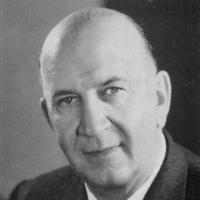DOCTOR OF EDUCATION (HONORIS CAUSA)
 Johannes de Klerk was born at Burgersdorp on 22 July 1903. He completed his school education at the Gymnasium High School in Potchefstroom before obtaining the B.A. degree and the Higher Education Diploma at the Potchefstroom University for Christian Higher Education (then the P.U.C.).
Johannes de Klerk was born at Burgersdorp on 22 July 1903. He completed his school education at the Gymnasium High School in Potchefstroom before obtaining the B.A. degree and the Higher Education Diploma at the Potchefstroom University for Christian Higher Education (then the P.U.C.).
Subsequently, in 1926, he entered the teaching profession where he attained a high degree of success. He stayed in that profession until 1946, for the last nine years filling the post of Head of the Primrose East School.
In 1946 he entered public life, first as Secretary to the Blankewerkersbeskermingsbond and then as Chief Secretary to the National Party of the Transvaal, his advancement being particularly rapid owing to his personal dedication and ability.
In 1949 he was elected to the Provincial Council of the Transvaal, soon thereafter becoming an M.E.C. for that Province. In 1954 he was invited to join the Cabinet and was elected a senator.
-
In the Cabinet he held the following portfolios:
-
From 1954 to 1958: Labour and Public Works
-
From 1958 to January 1961: Labour and Mines
-
From January 1961 to August 1961: The Interior, Labour and Immigration
-
From August 1961 to November 1966: The Interior, and Education, Arts and Science
-
From November 1966 to December 1967: Education, Arts and Science, and Immigration
-
Up to June 1969: National Education
In June 1969 he became President of the Senate an office which he still holds at present. In 1974 the State President awarded Senator De Klerk the Decoration for Meritorious Service.
In the early nineteen-sixties the Potchefstroom University for Christian Higher Education honoured Senator De Klerk by awarding him the degree of LL.D., honoris causa. In 1963 he was also made Chancellor of Potchefstroom University, an office which he still holds today.
Senator De Klerk's interest in education is evident right from his initial university training as a teacher. This interest extends to all levels of organised education and training. His long experience as a teacher stood him in good stead for his duties as Minister of Education, Arts and Science and subsequently as Minister of National Education.
His achievements as Minister of National Education are evidence not only of his interest and experience in education, but also of his insight into and sympathy for the theoretical and fundamental problems of organised education.
In his capacity as Minister of National Education, Senator De Klerk distinguished himself in initiating and carrying through endeavours to remove bottlenecks in the educational system in this country, thereby furthering the cause of more effective education and at the same time promoting its consolidation and co-ordination.
The following may be cited in this connection:
-
The National Education Policy Act of 1967 which:
-
brought about greater uniformity as regards educational practice and its co-ordination and control;
-
created the framework of principles within which organised education and training should take place;
-
laid down the principle that education should have a Christian character in a way permitting the religious convictions of parents and pupils to be respected;
-
supported the principle that education should have a broad national character; and provided for the national co-ordination of syllabuses, courses,
In general, it may be stated that the Minister, with great vision, has through legislation assured the preparedness of the nation.
-
He drew up and submitted legislation in terms of which teacher training in the Republic was altered radically, the main objective being to raise academic standards in the training of teachers. This assured proper recognition of the part to be played by the university in the scientific schooling of prospective teachers.
-
Through his direct intervention, his persuasive powers and his deep conviction that all facets of education in this country should be promoted and stimulated, he played an important role in the revision of accepted policy. This gave rise, in February 1963, to the announcement of the establishment of a university in Port Elizabeth, followed by the promulgation of the University of Port Elizabeth Act, Act No. I of 1964, and in 1966 the establishment of the Rand Afrikaans University in Johannesburg. With the founding of these two universities, Senator De Klerk made an exceptional contribution to the opening up of tertiary education possibilities and thus to the further development of academic endeavours in South Africa.
The decisions taken by Senator De Klerk and the improvements which he visualised for the future of education in the Republic as a whole were not always received with widespread enthusiasm. He, however, had the courage of his convictions and is today acclaimed in all quarters for what he has achieved.
The University of Port Elizabeth wishes to honour Senator De Klerk for his tremendous contribution to the extension and development of education at all levels in South Africa by conferring upon him the degree DOCTOR EDUCATIONIS, HONORIS CAUSA.